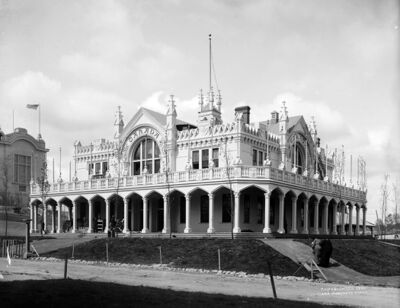Canada: Difference between revisions
No edit summary |
No edit summary |
||
| Line 1: | Line 1: | ||
{{short description|Canada National Pavilion}} | {{short description|Canada National Pavilion}} | ||
{{Infobox FairBuilding | {{Infobox FairBuilding | ||
| name = Canada National Pavilion | | name = Canada National Pavilion | ||
Latest revision as of 04:10, 4 March 2024
 | |
| Location | Place of Nations |
|---|---|
| No. of Buildings | 1 |
| Construction | |
| Construction Cost | $30,000 ($920,853 in 2021) |
Canada's pavilion was half way between Palaces of Agriculture, Forestry, Fish and Game, directly opposite the National Pavilion of Ceylon. The spacious structure, like most of the state pavilions was conceived as a club house.
Before the Fair[edit | edit source]
To attempt to cease the frontier life that included prostitution and liquor, the Canadian Government (only 35 years old at the time), eagerly welcomed immigration from Europe and the United States. One of the reasons the Canadian Government paid for the pavilion was to help bring more educated people into their country.
Description[edit | edit source]
The Canadian pavilion did not have any exhibits within their building, but did have many paintings and displays of timber in the Palaces.
Amazingly, they gave promises of free land for settlers.
Commissioner General Hutchinson lived in this building and was its official host.
The structure was dedicated on May 18th.
The Canadian Building is situated between the Agriculture and Forestry Buildings, close by the floral clock. This building is used solely for administrative and social purposes, and offers every facility of a club house to visitors. There are separate reception rooms for ladies and gentlemen, commissioners rooms, large lecture rooms, offices, etc. The walls are covered with paintings and photographs of Canadian scenes, etc. The Canadian Building is one of the prettiest of the foreign buildings. John J. Dunnavant & Co., of St. Louis, are the builders.
